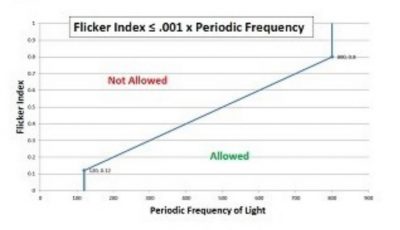Due to the LED solid-state lighting products have good luminous efficiency, long life and high reliability unique characteristics, so it’s became more popular by markets and customers. But at the same time, the LED solid lighting have fast response characteristics, it haven’t thermal inertia and afterglow effects, like traditional lamps, so it have big influence by current fluctuations, the current fluctuations affect the luminous flux output directly, the lighting flashing is the external expression of luminous flux change, that caused more and more people focus on lighting flashing issue. Dated 14th December, 2012, the EU officially released the (EU) NO 1194/2012 rules <Implementing rules of the European Parliament and the EU Council Directive 2009/125/EC on the eco-design requirements of directional lights, LED lights and related equipment requirements>.Compared with <European Parliament and Council Directive 2005/32/EC implementing rules for non-directional household lamps eco-design requirements> which posted by the European Commission Regulation (EC) NO 244/2009 Regulations dated 18th March, 2009, the new rules have complete mandatory and eco-design requirements. Start and Run-up time as the two indicators functional requirements in the industry has been more emphasis by manufacturers.
We just talked about the LED solid lighting product’s flicker effect, many people have no idea about this. The light source flashing is directly expression of luminous flux fluctuation, the light source is driving by AC current and pulsed DC current, luminous flux, illuminance or brightness change accordingly with the current amplitude of cyclical change. Normally, according to human eyes feeling, the flicker divided into Visiable Flicker and Invisible Flicker. When the frequency more than 100Hz, the human eyes can’t feeling the flicker, but it will cause eyestrain, headache etc, this is the flash effect, generally agreed that the flicker effect exists within 500Hz. For this issue, America Energy Star(ENERGY STAR lamps V2.1 draft 4 In the dimming performance requirements specified in the blink Conditions to be fulfilled, use all tools). As below figure:

Light source flashing allowed range:
1、Frequency less than 100Hz;
2、Within 120Hz-800Hz frequency range, the F1<0.001 X frequency;
3、Frequency more than 800Hz, F1 have no requirements;
4、Frequency is uncertain, PF<30%;
Besides, the CFL lamp output frequency range should at 20-30KHz, or more than 40KHz.
The nature of light source flicker is luminous flux output fluctuations. When measuring light fluctuates with time change, not only the brightness curve can be tested, but also can test luminous flux curve or illumination curve which are under the same conditions. ENERGY STAR(V1.0)make the rules to measuring flicker’s requirements:
1、Power and instrumentation are need meet the requirements of LM-79-08;
2、Multi-channel oscilloscope with memory function, necessary need to add attenuation probe. The sampling rate is more than 2kHz, the sampling time is more than 100ms;
3、Photo detector V(入) Correction, and need meet the requirements of the corresponding time;
4、For the absolute value of the metering(absolute photometry): Need use integrating sphere when measuring of the absolute value; For relative value metering(relative photometry): To ensure that the detector is capable of measuring the relative light output, and only receives light from the light source to be measured;
Before measuring, the CFL lamps need light on 100 hours at least and it’s need preheat before testing. LED lamp needn’t lighting on, the environmental temperature range should at 25+/-5 degrees.
To meet EU ErP rules and Energy Star requirements, Lisun developed LSRF-2 Lamp Start, Run-up time and Flicker Test System. The hardware of this system included PH3000 Transient Photometer, LSP-500VAC Programmable AC Power Source Meter, IS-MA series Integrating Sphere, DC3005 DC Power Source and SLS series Standard Lamp; the software of this system included LST-3000 Lamp Start and Run-up Time Test and FLK-3000 Lamp Flick Test. PH3000 Transient Photometer is developed base on rapid sampling techniques, it’s fully meet EU and Energy Star relevant requirements. Combined with computer, it can measuring and record the fast change luminous flux waveform and others parameters. PH3000 applied with 12 Bytes, the maximum sampling rate of 10M Hz high-speed A / D. The PH3000 also can used as common illuminometer which can be widely used in light flux, brightness, illumination, etc. photometric detection and measurement. LSP-500VAC Programmable AC Sine Wave Power Source is a high-power, low pure sine wave distortion, high stability, integrated power supply source table, it’s especially suitable for as test power supply of electronic ballasts, energy saving lamps and other small power household appliances. And this system also included IS-1.5MA Integrating Sphere, DC3005 DC Power Source and SLS-50W Standard Light Source.
Lisun Instruments Limited was found by LISUN GROUP in 2003. LISUN quality system has been strictly certified by ISO9001:2015. As a CIE Membership, LISUN products are designed based on CIE, IEC and other international or national standards. All products passed CE certificate and authenticated by the third party lab.
Our main products are Goniophotometer, Surge Generator, EMC Test Systems, ESD Simulator, EMI Test Receiver, Electrical Safety Tester, Integrating Sphere, Temperature Chamber, Salt Spray Test, Environmental Test Chamber, LED Test Instruments, CFL Test Instruments, Spectroradiometer, Waterproof Test Equipment, Plug and Switch Testing, AC and DC Power Supply.
Please feel free to contact us if you need any support.
Tech Dep: Service@Lisungroup.com, Cell/WhatsApp:+8615317907381
Sales Dep: Sales@Lisungroup.com, Cell/WhatsApp:+8618917996096
Your email address will not be published. Required fields are marked *